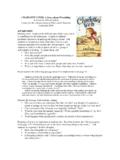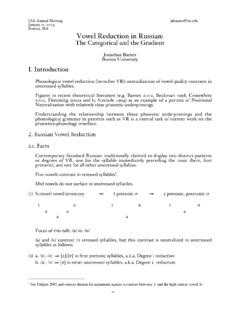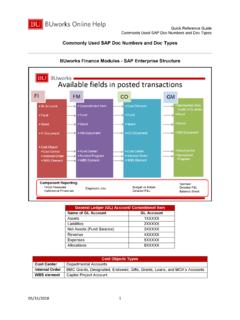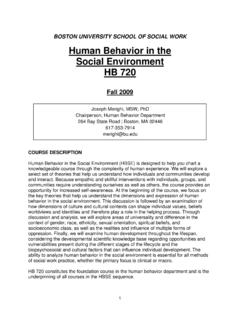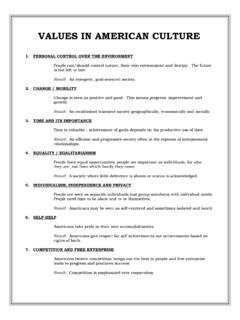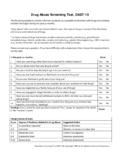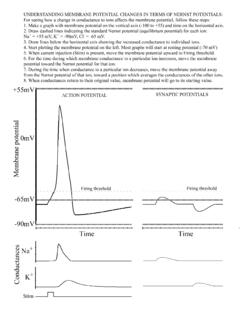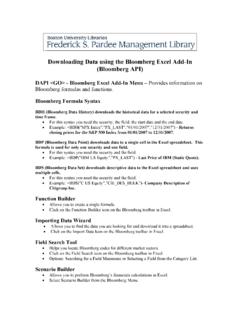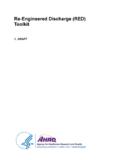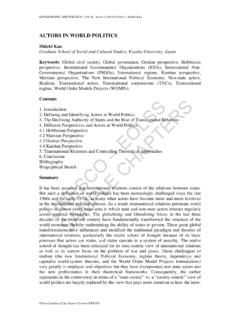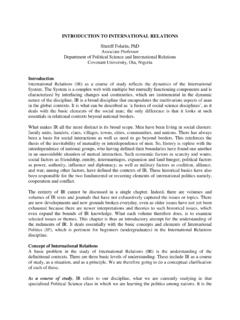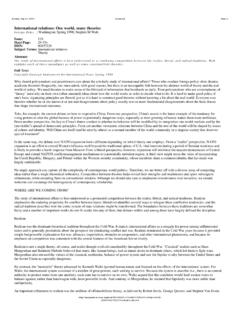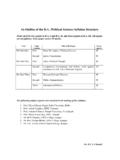Transcription of Print - Boston University
1 27, rue Saint-Guillaume 75007 Paris France T/ +33 (0)1 45 49 50 51 - F/ +33 (0)1 42 22 39 64 Ann e universitaire 2013/2014 Coll ge universitaire Semestre de printemps !"#$%&#'($)(*+,#%+-,&$+-.(/#.-,&$+'((/$+ (12!!3( Syllabus E-Mail: Course Description and Objectives This course is an introduction to the major theories of international relations. It will not only present and evaluate the major theories of international politics, but also examine the highly contested issue of what the proper subject matter of IR theory is and the relationship between the history of IR theory and the history of international politics. While it is clearly intended that you should learn a good deal of both international history and IR theory this semester, the course's objectives go beyond this: during the course, students will also confront basic questions which face the whole range of social science disciplines.))))))
2 Why is war so common? Are there alternatives to "states"? Why do persons perceive international relations as they do? To what extent is "international relations" a gendered concept? These are all questions that are explored in various theories of international relations. There are, concurrently, many purposes that might be served by theory. The objectives of this course include helping students to interpret and describe international relations, to study a variety of explanations for various events and non-events, and to consider various prescriptions or solutions to different kinds of problems. At a more prosaic level, it is hoped that you will become a more intelligent 'consumer' of news about international issues. As you become familiar with the various approaches to the study of IR, and with their particular strengths and weaknesses, you will be able more readily to identify the options available to international actors and the constraints within which they operate.
3 At the end of the semester students should: x be familiar with the main theories and models applied in the study of international relations, their ambitions, achievements and limitations; x have substantive knowledge of the cases covered by the course; x have developed a critical approach to current debates and issues in world politics and the discipline of international relations; and x have developed transferable skills, including critical evaluation, analytical investigation, written presentation and communication. 1) A Mid-Term Take Home Exam during Week 6. The exam should be no longer than 1200-1500 words. You will have to answer one question among four presented. 2) A Final Take-Home Exam during the last week of class. The exam should be no longer than 1200-1500 words. You will have to answer one question among four presented. 27, rue Saint-Guillaume 75007 Paris France T/ +33 (0)1 45 49 50 51 - F/ +33 (0)1 42 22 39 64 Week 1: Introduction: Theories and International Relations Reading: MINGST, Karen (2004) Essentials of International Relations, 3rd Edition, New York, Norton, 55-82 Week 2: Evolution of Theories: Great Debates Reading: +2))0$11 6 WDQOH\ An American Social Science: International Relations Daedalus, Vol.
4 106, No. 3, Pp. 41-60. Week 3: Realism, Neorealism & Structural Realism Reading: SHIMKO, Keith L. (1992) 5 HDOLVP 1 HRUHDOLVP DQG $PHULFDQ /LEHUDOLVP The Review of Politics, Vol. 54, No. 2, Pp. 281-301. Week 4: Idealism, Liberalism & Neoliberalism Reading: WYATT-:$/7(5 $QGUHZ $GDP 6 PLWK DQG WKH /LEHUDO 7 UDGLWLRQ LQ ,QWHUQDWLRQDO 5 HODWLRQV Review of International Studies, Vol. 22, No. 1, Pp. 5-28. Week 5: Marxism, Socialism & Critical Theories Reading: COX, Robert W. (1981) Social Forces, States and World Orders: Beyond ,QWHUQDWLRQDO 5 HODWLRQV 7 KHRULHV Millennium: Journal of International Studies, Vol. 10, No. 2, Pp. 126-155. Week 6: Constructivism Reading: RUGGIE, John Gerard (1998) What Makes the World Hang Together? Neo-Utilitarianism and the Social Constructivist Challenge International Organization, Vol. 52, No. 4, Pp. 855-885. Week 7: Feminism Reading: 7,&.)
5 1(5 - $QQ What Is Your Research Program? Some Feminist Answers to International Relations Methodological Questions International Studies Quarterly, Vol. 49, No. 1, Pp. 1-21. Part I Introduction Part II Classical General Theories Part III Recent General Theories 27, rue Saint-Guillaume 75007 Paris France T/ +33 (0)1 45 49 50 51 - F/ +33 (0)1 42 22 39 64 WEEK 8: Green Theories Reading: HOMER-'L[RQ 7 KRPDV ) On the Threshold: Environmental Changes as Causes of Acute Conflict International Security, Vol. 16, No. 2, pp. 76-116. WEEK 9: Foreign Policy Theories Reading: HILL, Christopher What Is to Be Done? Foreign Policy as a Site for Political Action International Affairs, Vol. 79, No. 2, Pp. 233-255. WEEK 10: Theories of Security Reading: BALDWIN, David A. 7KH &RQFHSW RI 6 HFXULW\ Review of International Studies, Vol. 23, No. 1, Pp. 5-26. Week 11: Theories of War Reading: '$:621 'R\QH The Origins of War: Biological and Anthropological Theories History and Theory, Vol.]
6 35, No. 1, Pp. 1-28. Week 12: Conclusion : Theory and Practice Lecture : -(17/(621 %UXFH : The Need for Praxis: Bringing Policy Relevance Back In International Security, Vol. 26, No. 4, Pp. 169-183. Selected Bibliography Handbooks and Basic Texts ARON, Raymond (1967) 4X HVW-FH TX XQH WKpRULH GHV UHODWLRQV LQWHUQDWLRQDOHV" , Revue Fran aise de Sciences Politique, Vol. 17, Pp. 309-318. ARON, Raymond (1963) Une sociologie des relations internationales , Revue fran aise de sociologie, Vol. 4, No. 3, Pp. 307-320. BADIE, Bertrand (2001) Les grands d bats th oriques de la d cennie , La Revue Internationale et Strat gique, Vol. 41, Pp. 47-54. BALDWIN, David A. (1993) 1 HROLEHUDOLVP 1 HRUHDOLVP DQG :RUOG 3 ROLWLFV LQ %$/':,1 David A. (Ed.), Neorealism and Neoliberalism. The Contemporary Debate, New York, Columbia University Press, Pp. 4-25. BATTISTELLA, Dario (2012) Th ories des relations internationales, 4 me dition, Paris, Presses de Sciences Po.))
7 Part IV Applied Theories 27, rue Saint-Guillaume 75007 Paris France T/ +33 (0)1 45 49 50 51 - F/ +33 (0)1 42 22 39 64 BOOTH, Ken & SMITH, Steve (Ed.) (1995) International Relations Theory Today, University Park, The Pennsylvania State University Press. BURCHILL, Scott et alli. (2001) Theories of International Relations, 2 me dition, Basinstoke, Palgrave. BUZAN, Barry (1995) 7KH /HYHO RI $QDO\VLV 3 UREOHP LQ ,QWHUQDWLRQDO 5 HODWLRQV 5 HYLVLWHG LQ BOOTH, Ken & SMITH, Steve (dir.), International Relations Theory Today, University Park, The Pennnsylvania State University Press, Pp. 198-216. DOYLE, Michael W. (1997) Ways of War and Peace. Realism, Liberalism, and Socialism, New York, W. W. Norton and Company. DOYLE, Michael W. & IKENBERRY, G. John (Ed.) (1997) New Thinking in International Relations Theory, Boulder, Westview Press. DOUGHERTY, James E. & Robert L. PFALTZGRAFF, JR.
8 (2001) Contending Theories of International Relations. A Comprehensive Survey, 5th Edition, New York, Addison, Wesley, Longman. DUNNE, Tim, KURKI, Milja & SMITH, Steve (Ed.) (2007) International Relations Theories, Discipline and Diversity, Oxford, OUP. ELMAN, Colin & FENDIUS ELMAN, Miriam (Ed.) (2003) Progress in International Relations Theory. Appraising the Field, Cambridge, MIT Press. FONTAINE, Andr (2001) Les paradigmes artificiels , La Revue Internationale et Strat gique, Vol. 41, Pp. 55-62. FRANK, Robert (2003) Penser historiquement les relations internationales , Annuaire fran ais des relations internationales, Vol. 4, Pp. 42-65. GADDIS, -RKQ /HZLV ,QWHUQDWLRQDO 5 HODWLRQV 7 KHRU\ DQG WKH (QG RI WKH &ROG :DU LQ LYNN-JONES et MILLER (dir.), The Cold War and After: Prospects for Peace, Cambridge Mass., MIT Press, Pp. 323-388.)
9 ( galement disponible dans International Security, Vol. 17, No. 3,1992-93). JACKSON, Robert (1996) Is There a Classical International Theory" LQ 60,7+ 6 %227+ K. & ZALEWSKI, M. (dir.), International Theory: Positivism and Beyond, Cambridge, Cambridge University Press, Pp. 203-218. JACKSON, Robert & S RENSEN, Georg (2007) Introduction to International Relations. Theories and Approaches, 3rd Edition, Oxford, OUP. LEBOW, et T. RISSE-.$33(1 ,QWURGXFWLRQ LQ 5 1 /(%2: HW 7 5,66(-KAPPEN (dir.), International Relations and the End of the Cold War, New York, Columbia University Press, Pp. 1-21. 0$%(( %U\DQ Levels and Agents, States and People: Micro-Historical Sociological Analysis and International Relations International Politics, Vol. 44, Pp. 431-449. MUSITELLI, Jean (2001) Les paradigmes d chus? 1991-2001 : permanences et changements , La Revue Internationale et Strat gique, Vol.)))))
10 41, Pp. 37-45. 27, rue Saint-Guillaume 75007 Paris France T/ +33 (0)1 45 49 50 51 - F/ +33 (0)1 42 22 39 64 RAGARU, Nad ge & Robert CHAOUAD (dir.) (2002), Relations Internationales : La tentation G H[LVWHU (WDW G XQH GLVFLSOLQH HQ )UDQFH Revue Internationale et Strat gique, No. 47, Pp. 77-167. ROCHE, Jean-Jacques (2001) Th ories des relations internationales, 4 me dition, Paris, Montchrestien. ROSENAU, James N. & DURFEE, Mary (1995) Thinking Theory Thoroughly. Coherent Approaches to an Incoherent World, Boulder, Westview Press. SMIT+ 6 WHYH - %$</,6 ,QWURGXFWLRQ LQ -RKQ %$</,6 HW 6 WHYH 60,7+ GLU The Globalization of World Politics: An Introduction to International Relations, 3 me edition, Oxford, Oxford University Press, Pp. 1-13. 6 5(16(1 *HRUJ ,5 7 KHRU\ $IWHU WKH &ROG :DU Review of International Studies Vol. 24, No. 5, pp. 83-100. STERLING-FOLKER, Jennifer (Ed.) (2006) Making Sense of International Relations Theory, Boulder, Lynne Rienner Publishers.))]
